Steve Addison's Blog
October 16, 2025
When Paul Spoke Truth to Power
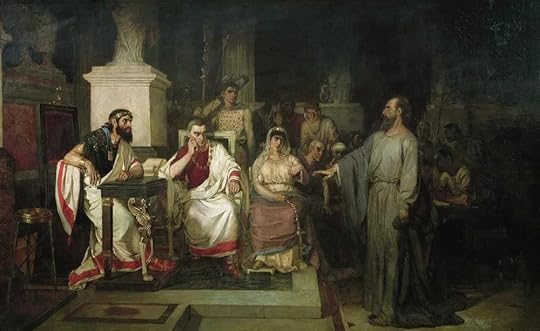
Vasily Surikov, The Apostle Paul Explains the Tenets of His Faith in the Presence of King Agrippa, his Sister Veronica, and Proconsul Festus, 1875.
As I’ve been gathering stories and case studies for my next book, I’ve been watching and learning from movements around the world that are facing religious and political opposition. The book of Acts comes alive when you read it through the eyes of these persecuted saints.
They rebuke our preoccupation with politics and power. They remind us of the core missionary task.
In Acts 24–25, the Jewish leadership wants Paul dead and they want the Romans to do the deed.
Paul is facing two charges. (1) Defiling the temple, a crime that the Romans agreed deserved death. (2) Threatening the peace of the empire by following a man who was crucified for claiming to be the king of the Jews.
Paul counters by saying he came to Jerusalem to worship, not to foment rebellion. He asserts he is a faithful Jew who acknowledges Jesus as Israel’s Messiah, and that the movement known as the Way is not a breakaway sect but the fulfillment of Judaism.
Paul is in the right; the charges are false. There is no evidence for a conviction, but if successive Roman governors set Paul free, they fear a Jewish uprising. The deadlock is broken when Paul, a Roman citizen, refuses to go to Jerusalem for a trial and instead appeals to the emperor in Rome.
It’s out of the governor’s hands now, but how will he advise the emperor on why he is sending a prisoner to the emperor who appears to be innocent.
Paul stands before an impressive audience, in chains — a Jewish king, a Roman governor, the military commanders, and the leading men of the city of Caesarea, the Roman military headquarters.
Through Paul’s weakness, God is revealing where real power resides. The risen Lord is fulfilling his promise that Paul would be his witness before kings and governors.
This is the climax of Paul’s defense speeches in Acts. He speaks, not just for himself, but for the movement he represents. Paul is sandwiched between the Jewish elite who want him dead, and the Roman authorities who find him innocent but fear the trouble his release would cause. Yet Paul doesn’t consider himself a victim. Instead, he uses these hearings to bear witness to his Lord.
As a faithful Jew, Paul recounts how he persecuted followers of Jesus, and how, on the way to Damascus, he discovered that Jesus of Nazareth was the risen Lord who shares God’s glory. This Jesus commissioned Paul to serve in his mission.
This is how the risen Lord described Paul’s mission and ours:
To open the eyes of both Jews and Gentiles so they could see the reality of Jesus, the crucified and victorious Messiah, Savior, and Lord.
To turn them from darkness to light. People are captive to Satan, but they can be liberated by embracing the truth about Jesus and turning to God in repentance.
To tell them that they may receive forgiveness of sins and a place among God’s people, made holy by faith in Jesus.
Paul’s mission was not to overturn the Jewish law and temple, or to challenge Roman rule. Instead, he was called to turn the Gentiles to a new way of life.
He wants everyone listening—the Roman governor, the Jewish king, the military commanders, and the leading men of Caesarea—to become like him (apart from his chains!) and put their faith in Jesus.
Once again, Paul turns legal defense into gospel proclamation. He obeys Jesus’ commission, at the risk of prison and death. He wants Jews like Agrippa and Gentiles like Festus to be included among the people of God.
Paul was confident that his life and ministry were in God’s hands, and so before these powerful rulers he could freely proclaim the good news and call them to faith in Christ. Paul might have lobbied for all kinds of political causes or he might have demanded protection for the Christian community, but instead he offers salvation in Christ to these representatives of an oppressive empire. Paul trusted in the promise of Jesus, who said that when his disciples stand before rulers, he would give them the words and the wisdom they needed.
Festus and Agrippa reject the call to repent, but by now, two Roman governors and a Jewish king have all agreed that Paul has done nothing under Roman law to deserve death or prison.
There’s no record of what Paul said to the emperor Nero when he stood before him in Rome. I think Luke is saying that Paul would have said something similar to what he said to two Roman governors and a Jewish king. He defended himself against the charges and then preached the gospel. That’s what it means to speak truth to power.
Politics is not ultimate; God is. Our mission is the spread of God’s Word, resulting in disciples and churches to the glory of God. Everywhere.
Adapted from Acts and the Movement of God.
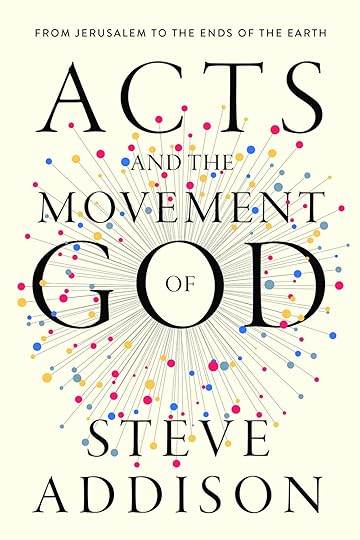
October 14, 2025
Winning the 60%

I’ve heard it said many times that the prevailing models of church and ministry can only reach around 40% of the US population; new models are required to reach the other 60%.
There comes a time to turn critique into action and that time is long overdue. Where are the new disciples among the 60%? Let’s hear their stories. Where is the gospel going out in the power of the Spirit, yielding the fruit of new disciples and new churches? (We’re not talking about multiplication yet.)
Every movement begins with a critique, but a critique is not a movement. Without a vision, critique becomes cynicism. But vision is not enough. Vision without action is fantasy. Time’s up, we need to see a vision validated by action that produces the outcomes we’re after. In this case, new disciples and churches to the glory of God.
If that’s not happening, it’s time to look elsewhere for solutions.
October 12, 2025
Escaping the Missional Fog

One major reason for a tendency to move away from a focus on mission as disciple-making and towards broader definitions has been a loss of belief in the eternal consequences of human lostness and in the uniqueness of Christ’s work as the means by which human beings are restored to the Father.
Under those conditions the emphasis necessarily moves away from the spiritual and eternal and towards the physical and temporal.
Keith Ferdinando
When mission becomes everything, you’re in danger of drifting into the mission fog.
Keith Ferdinando has written on the background of our missional angst and four prevailing views. He argues that at the heart of our mission is the command to make disciples of Jesus Christ.
October 8, 2025
When mission becomes everything.

For the last year, I’ve been gathering stories and case studies of multiplying movements of disciples and churches around the world. I’m now turning the research into a book to be published in the first half of 2026.
What’s striking about these movements is the clarity of their mission and the way they turn vision into action. Their mission is to multiply disciples and churches to the glory of God among every people group and in every place. They move towards that mission in tangible ways by going, identifying receptive people, sharing the gospel, gathering around the scriptures, making disciples, planting churches, and developing leaders.
They know what to do on Monday morning.
Contrast mission in the Western world. For more than a century, we’ve been discussing, debating, and defining what “mission” means. The emerging consensus—first among mainline denominations and now a growing number of evangelicals—is that “mission” is about the renewal of the whole creation, which includes evangelism but also seeks socio-political transformation and creation care. Mission has become everything and therefore nothing.
These movements do not deny the social impact of the gospel. They witness that impact every day. What they do deny is that transformation is the goal rather than the fruit of their mission. They see transformation because the gospel, discipleship, and church formation are at the heart of their mission.
The men on death row in Texas who gather for discipleship and community are not trying to dismantle the unjust power structures of the world in which they grew up, or of the prison system in which they live. They are getting right with God and learning to love the people around them. The atmosphere in the prison is changing for the better as an overflow of the gospel. It’s possible to conceive of a situation in which prison officials and gang members are antagonistic to the gospel. The result would be persecution, not transformation. That was the pattern in the Book of Acts.
Consider the disciples in Islamist Iran, Communist Laos, or Hindu nationalist India; should their mission be socio-political transformation, they can expect a violent confrontation with the authorities. They’re willing to suffer, but they’d rather be suffering for the gospel.
The truth is, the restructuring of society is something only privileged and powerful Westerners can imagine.
Which cities or societies were transformed by the disciples in the New Testament? Jesus announced the destruction of Jerusalem, not its transformation. Paul stood before Nero in chains for the sake of the gospel. He wasn’t there to advise the emperor on economic policy.
One reason why there are so few multiplying movements in the West is that we’re not clear on the core missionary task, and we don’t know what to do on Monday morning. Perhaps we have something to learn from these movements that are multiplying disciples and churches around the world.
September 22, 2025
Forests in the Seed: Takeaways.
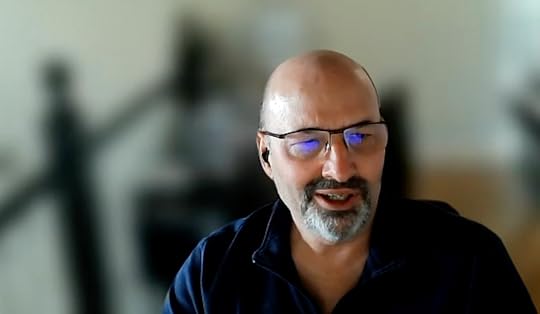
Stan Parks
Some highlights from my conversation with Stan Parks, coauthor of The Forests in the Seed.
On the numbers
In 2000, there were 100,000 disciples in multiplying movements. By 2025, there were 100 million.
We know of over 2,000 movements in the world.
On the definition of a movement
Consistent fourth-generation reproduction of churches in four streams. When it reaches that point, only about 1% of the time does it actually fail.
On cascading movements
Movements start other movements. Today, over 90% of movements are started by existing movements.
On movement characteristics
They look very much like the New Testament church. In a country in West Africa, visited-- and as we're talking to different people involved in the movement, "Hey, tell me what you do."
Most of them say, "Well, I'm a church planter, and I'm a schoolteacher. I'm a church planter, and I'm a taxi driver." One guy said, "I'm a church planter, and I'm a judge." His friend said, "Well, he's actually the chief justice of the Supreme Court for the country."
So there's just this sense that everyone is a disciple-maker, everyone is a church planter. They really do believe in the priesthood of the believer, of every believer.
On traveling light
They're not dependent on external funding. They're not dependent on professionally trained clergy. They're not building buildings, for the most part.
On the secret sauce
The key is not tactics, but transformed disciples using proven biblical strategies that result in reproducing disciples, leaders, and churches.
On the Holy Spirit
They're seeing people healed and demons cast out and people raised from the dead. You know, the power of the Holy Spirit in their lives is really the key.
70–80% or more of these households of peace are found through miracles. A healing happens, the household's open. A demon's cast out, the household's open. And again, you see the same thing in Acts. The miracle often led to openness.
On the priesthood
We have--in the modern Westernized church, we operate in some ways very much like the Old Testament. We have priests who interpret God's Word to us and are intercessors to God for us, whereas in the New Testament, everybody was a priest.
On hardship
The most vibrant movements have started in the hardest places.
The largest single movement in the world started in the holiest city of Hinduism, and the largest family of movements was started by people who are former jihadists. God is doing more than we could have asked or imagined.
On outside funding
It's a little bit of a myth that some people have that you can start a movement with no money. Lost people will not pay for their own evangelization. There's always some money to send some people to a new place. And so, the key factor that we're going to keep in mind is how to give money appropriately, so it doesn't create dependence, so it doesn't cause dissension, disunity, and is used the most strategically.
So, typically what happens is the movements are sending people, they're raising funds internally to help in crises, or to send people to new places, or to start businesses to create a stronger economic base to fund the movement and efforts overall. And then the outsiders can come alongside and say, "Okay, you're already doing this, you're showing us a priority through your own sacrificial giving," as one movement leader put it.
So, we'll accept some outside money so we can do more of that, but we won't accept outside money to do things we wouldn't want to be doing, or are already trying to do by ourselves.
On finishing the task
And so, you know, the global church over the last 40 years has grown at almost an identical rate to population growth globally. It's right at 1.8%. Movements have grown at 23% a year. So that's not some, it's not, you know, "Oh, they're doubling every single year." I mean, 23% is significant. That means four churches in a movement, on average, start one new church a year. But that 23% ends up with a 10X factor every five or 10 years.
I think you're going to probably need movement fruit in 40,000 to 50,000 different population segments to actually bring the gospel to the 2 to 3 billion plus people that need it, that have never had the chance. What that looks like, when it happens, how it happens, you know, only God knows.
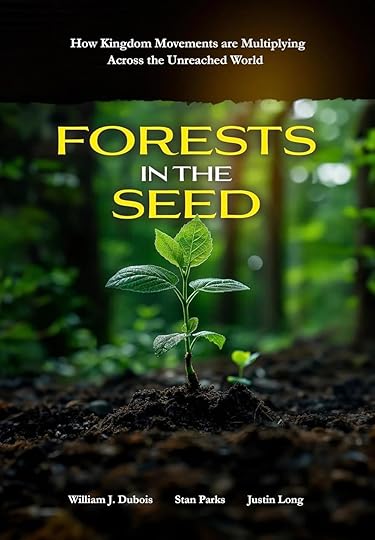
September 18, 2025
358-Forests in the Seed
A conversation with Stan Parks, one of the three authors of Forests in the Seed: How Kingdom Movements are Multiplying Across the Unreached World.
They track the rise of multiplying movements of disciples and churches around the world and identify their characteristics.
Some encouraging news:
Recent research covering 1995 to the present has made a staggering discovery. Many movements fade away before reaching multiple generations, but those that do reach multiple generations become a powerful, nearly unstoppable force. An astonishing 99% of movements that have reached multiple branches of four or more generations of churches have thrived since their inception. The disciples and churches in these movements have grown exponentially at an astounding average rate of 23% yearly—much faster than the global population. The total number of disciples in these movements has doubled every 3.5 years—a testament to the potency of divine multiplication.
This global growth has occurred over four distinct stages:
From 1995 to 2000, from 10,000 to over 100,000 disciples
From 2000 to 2005, from 100,000 to over 1 million disciples
From 2005 to 2015, from 1 million to over 10 million
From 2015 to 2024, the number surpassed 100 million.
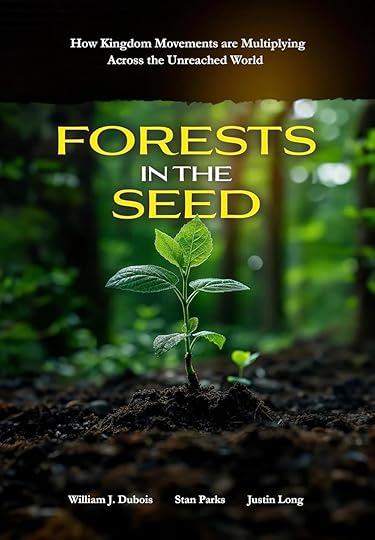
September 16, 2025
A movement of priests
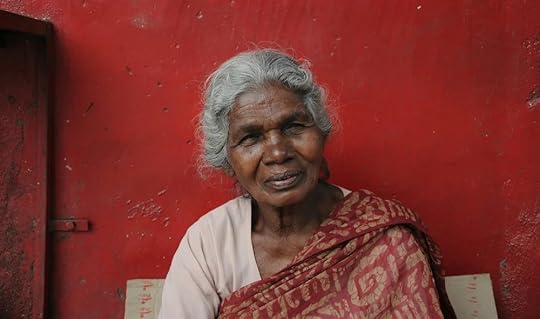
If there is one distinctive that separates movements from everybody else, it is the practice of the priesthood of every believer.
Somewhere in Rajasthan, there’s an 80-year-old grandmother who can’t read or write. Yet, she goes out sharing her story, sharing the gospel, praying for the sick, sharing stories from Scripture, making disciples, baptizing them and teaching them to follow Christ. I’ve met the young woman, who’s been doing the same, since she was twelve. This is what sets movements apart. They practice the priesthood of every believer.
When Jesus called fishermen to be his disciples, he called them to follow and fish for others. He gave them something to do. They were ordinary, unqualified men.
The woman at the well was the first missionary to her Samaritan village. The demoniac was the first missionary into the Decapolis.
God chose all Israel to be a kingdom of priests, a holy nation that, through their obedience to the covenant, they would bear witness to him throughout the world (Exodus 19:4-6). Tragically, Israel fell well short of God’s intention. Jesus fulfilled God’s plan for Israel and brought into being renewed Israel made up of Jews and Gentiles who put their faith in the Messiah.
Christ is our Priest and all believers share in his priesthood through union with him. There is no priestly class.
The Great Commission was given to all of God’s people. Our Priest and risen Lord gave us the authority to make disciples of the nations by going, baptizing, and teaching them to obey what he has commanded.
The royal priesthood is on display in Acts as the priests of the new covenant baptize, pray, worship, read and obey the Scriptures, love one another, celebrate the Lord’s Supper, give sacrificially, and take the gospel from Jerusalem to the world (Acts 2:36–47).
This is what Peter means when he declares, ‘You are a chosen people, a royal priesthood, a holy nation, God’s special possession, that you may declare the praises of him who called you out of darkness into his wonderful light’ (1 Peter 2:9).
In John’s vision of heaven, he sees the Lamb that was slain who, with his blood, has purchased people from every tribe and language and people and nation. For what purpose? That they would be a kingdom and priests to serve our God for all time (Revelation 5:9-10).
The gospel goes out in the power of the Spirit, through these royal priests. God’s people are being gathered from every tribe and language. For all eternity, they will be a kingdom of priests, God’s chosen people, declaring his glory.
September 3, 2025
357-Joe and Dawn’s Story

One couple’s journey in loving God, loving each other and multiplying disciples and churches in a lost world.
Previously with Joe. . .
August 28, 2025
Living with uncertainty

It was 2016, Joe and Dawn had decided to move into northern Iraq when, over the car radio, came the news that ISIS had brutally murdered Christians near where they were going to live.
What would they do? Ten years before, Dawn had faced the risk of serving in Iraq, but she was single at the time. Now she and Joe were married with two young children. They determined, ‘We were not going to walk away from the call to make Jesus known. He is worth it all.’
The Kurdish region of northern Iraq was a haven for Kurds, Syrians, Iranians, and Afghans fleeing regional wars. Many were coming to know Christ. In their eight years there, Joe and Dawn were able to get the gospel out, identify leaders among the new disciples and train them to multiply disciples and churches among their people.
Life was uncertain. Missiles dropped near their home. The disciples were persecuted, even to the point of death. Dawn got used to living with uncertainty. ‘Things can be out of control. And I can know that God is still on his throne.’
This is what Jesus predicted. In the time between his first and second comings, he said the world would be torn by wars, famine and natural disasters. It would be a time when his disciples were hated and persecuted. A world of false prophets and deception. A world of evil where the love of most will grow cold.
Then, surprisingly, Jesus announced that the gospel would be proclaimed throughout the same world to every people group, and then the end would come.
That’s why Joe and Dawn took their family into northern Iraq.
Podcast: 356-Joe’s Story (2)
August 21, 2025
356-Joe’s Story (2)
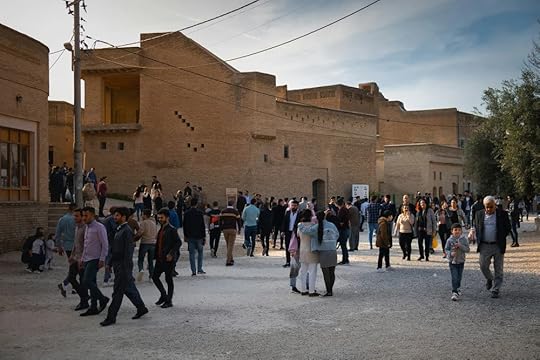
Northern Iraq
Forced out of India, Joe and family head for Iraq.



